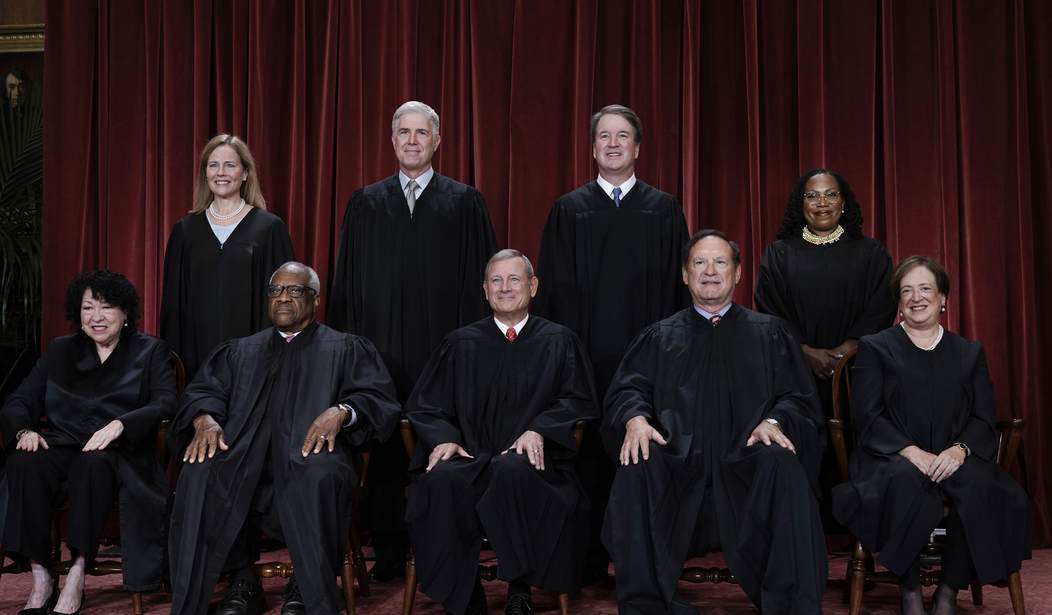The United States Supreme Court on Thursday morning released its opinion in Securities and Exchange Commission v. Jarkesy, et al. and delivered a stinging rebuke to federal bureaucrats and the administrative state. The case dealt with the Securities and Exchange Commission's practice of seeking civil penalties against defendants accused of securities fraud in-house before administrative law judges without a jury trial — a significant unchecked power wielded by federal bureaucrats.
The question before the Supreme Court was "whether the Seventh Amendment permits the SEC to compel respondents to defend themselves before the agency rather than before a jury in federal court." In a 6-3 opinion, the Court ruled that the SEC cannot — and that such practices violated the Seventh Amendment's clear protection of the right to trial by jury.
🧵Today in SEC v. Jarkesy we got a long overdue vindication of Seventh Amendment rights.
— Carrie Severino (@JCNSeverino) June 27, 2024
Jarkesy is an important ruling and an illustration of how closely related individual rights are to the separation of powers and the structural constitution. Justice Scalia used to accurately… pic.twitter.com/DcFWwFOpR3
In his opinion for the majority, Chief Justice Roberts reiterates that a "defendant facing a fraud suit has the right to be tried by a jury of his peers before a neutral adjudicator" and warns his dissenting colleagues "would permit Congress to concentrate the roles of prosecutor, judge, and jury in the hands of the Executive Branch."
That, Roberts continues, "is the very opposite of the separation of powers that the Constitution demands" and means the case's namesakes are "entitled to a jury trial in an Article III court."
A concurring opinion from Justice Gorsuch notes the importance of a jury trial traces its roots to the start of the American Revolution, a time when "the British government and its agents engaged in a strikingly similar strategy [as the SEC] in colonial America" through which "[c]olonial administrators routinely steered enforcement actions out of local courts and into vice-admiralty tribunals where they thought they would win more often. These tribunals lacked juries. They lacked truly independent judges," Gorsuch explains. After prevailing against the Crown, America's founders "went to great lengths to prevent a backslide toward anything like the vice-admiralty courts.
Recommended
Gorsuch's closing lines are an important reminder that constitutional rights are not created to protect the favored — whether speech, due process, or defendants — but to ensure equal treatment and uphold the rule of law:
While incursions on old rights may begin in cases against the unpopular, they rarely end there. The authority the government seeks (and the dissent would award) in this case—to penalize citizens without a jury, without an independent judge, and under procedures foreign to our courts—certainly contains no such limits. That is why the Constitution built “high walls and clear distinctions” to safeguard individual liberty. Plaut v. Spendthrift Farm, Inc., 514 U. S. 211, 239 (1995). Ones that ensure even the least popular among us has an independent judge and a jury of his peers resolve his case under procedures designed to ensure a fair trial in a fair forum. In reaffirming all this today, the Court hardly leaves the SEC without ample powers and recourse. The agency is free to pursue all of its charges against Mr. Jarkesy. And it is free to pursue them exactly as it had always done until 2010: In a court, before a judge, and with a jury.
In a statement congratulating Jarkesy and "his courageous counsel," New Civil Liberties Alliance (NCLA) President and General Counsel Mark Chenoweth noted that while "others told them that a Seventh Amendment argument stood no chance...Mike McColloch and Karen Cook refused to listen." The "perseverance" of Jarkesy's legal team "won a mighty victory against injustice by persuading the Supreme Court to restore jury trial rights to all Americans — even those being hounded by the Administrative State," Chenoweth emphasized.
Peggy Little, NCLA senior litigation counsel, called Thursday "a day to rejoice" due to the Supreme Court's "restoration of Americans' constitutional guarantee of a right to be tried by a jury of their peers."
Little said the opinion "marks a historic declaration of independence from decades of encroachments by the administrative state" and means the "Dodd-Frank Act's attempt to extinguish Americans' jury-trial protections by sweeping securities prosecutions into the SEC’s notoriously biased in-house courts — where agencies prevail 90-100% of the time— has come to a well-deserved end."
It’s with your support that we can continue to break down the biggest stories of the day and deliver the news that matters most to you, free from liberal bias and Big Tech censorship. Join Townhall VIP here and take advantage of our limited-time 60% off sale now!

























Join the conversation as a VIP Member